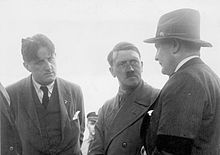Ernst Hanfstaengl
At the outbreak of World War I, he asked the German military attaché in New York City, Franz von Papen, to smuggle him back to Germany.[5] A fellow member of the Harvard's Hasty Pudding club who worked at the U.S. Embassy asked Hanfstaengl to assist a military attaché sent to observe the political scene in Munich.Hanfstaengl composed both Brownshirt and Hitler Youth marches patterned after his Harvard football songs and, he later claimed, devised the chant "Sieg Heil".While on board the plane he feared a plot on his life and learned more details from the pilot about the mission, who eventually admitted he had been ordered to drop Hanfstaengl over Republican-held territory, which would have meant almost certain death.That version of the story was related by Albert Speer in his memoirs, who said that the "mission" to Spain was an elaborate practical joke, concocted by Hitler and Goebbels, designed to punish Hanfstaengl after he had displeased the Führer by making "adverse comments about the fighting spirit of the German soldiers in combat" during the Spanish Civil War.Hanfstaengl was issued sealed orders which were not to be opened until his plane was in flight, which specified that he was to be dropped in "Red Spanish territory" to work as an agent for Francisco Franco.[citation needed] He made his way to Switzerland and, after securing his son Egon's release from Germany, he moved to Great Britain, where he was imprisoned after the outbreak of World War II.In 1943, he helped Henry Murray, the director of Harvard University's psychological clinic, Walter Charles Langer, a psychoanalyst, and other experts create a report for the Office of Strategic Services, titled Analysis of the Personality of Adolph Hitler.William Shirer, a CBS journalist who resided in Nazi Germany until 1940 and was in frequent contact with Hanfstaengl, described him as an "eccentric, gangling man, whose sardonic wit somewhat compensated for his shallow mind.In his story "The Sacred Grove", collected in "While Rome Burns", Alexander Woollcott refers to an encounter with an uncooperative attendant in a New York picture store in 1916, whom he later identifies as Hanfstaengl.In chapter 3 of “Munich Wolf” (2024) by Rory Clements, the fictional main character Detective Sebastian Wolff is introduced on page 20 to the non-fictional person of Ernst ‘Putzi’ Hanfstaengl.

German AmericanHarvard UniversityAdolf HitlerNazi GermanyFranklin D. RooseveltDjuna BarnesMunichBavariaGermanyEdgar HanfstaenglWilhelm HeineAmerican Civil WarUnion ArmyJohn SedgwickDuke Ernst IISaxe-Coburg and GothaHarvard CollegeWalter LippmannJohn ReedNew York CityHarvard Club of New York CityFranklinTheodore RooseveltWilliam Randolph HearstCharlie ChaplinWorld War IFranz von PapenHitlerHermann GöringBerlinDiana MitfordNazi PartyNurembergHasty Pudding clubU.S. EmbassyTruman SmithBeer Hall PutschAustriaUffingMein KampfVölkischer BeobachterBrownshirtHitler YouthSieg HeilHanns Heinz EwersKurt LüdeckeWinston ChurchillReichstag firePropaganda MinisterJoseph GoebbelsUnity MitfordnationalistSpanish Civil WarRepublicanLeipzigAlbert SpeerFührerFrancisco FrancoLeipzig AirportSchwabingSwitzerlandGreat BritainWorld War IIFranklin RooseveltHenry MurrayWalter Charles LangerOffice of Strategic ServicesAnalysis of the Personality of Adolph HitlerrepatriatedWilliam ShirerHarvard University BandLong IslandEgon LudwigU.S. Army Air CorpsPeter ConradiLiev SchreiberRandy QuaidInside the Third ReichRonald PickupThe Nightmare YearsHerzogSaul BellowAlexander WoollcottRory ClementsList of books by or about Adolf HitlerToland, JohnShirer, William L.Geli RaubaltyphoidAmerican HospitalThe Gathering StormSpartacus EducationalRise and Fall of the Third ReichBellow, SaulConradi, PeterWayback Machine20th Century Press ArchivesLeaderAnton DrexlerMartin BormannAdolf Hitler's rise to powerBrown House, MunichDenazificationEnabling Act of 1933German Workers' PartyNational Socialist ProgramNazismNight of the Long KnivesNuremberg ralliesRöhm scandalThule SocietyAmt RosenbergHitler's ChancelleryNazi Party ChancelleryOffice of Colonial PolicyOffice of Military PolicyOffice of Racial PolicyOffice of Foreign AffairsNSDAP/AOSS Education OfficeDas Schwarze KorpsDas ReichInnviertler HeimatblattArbeitertumDer AngriffPanzerbär